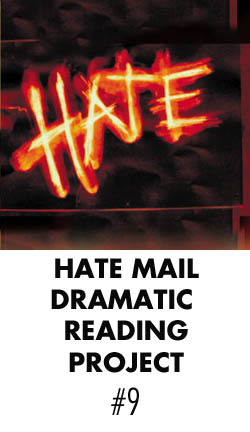Back in 2005, I prepared a list of literary podcasts. Five years later, the original list has become outdated, with many of the previously listed programs biting the dust. (There were many more that appeared and disappeared, including the Washington Post Book World podcast, which folded with scant notice not long ago. This was too bad. Because Ron Charles hammed it up in a manner all too rare in a mainstream books podcast.) Literary podcasts, while nowhere nearly as abundant as they should be, are still around. And this updated list represents an effort to track any and all podcasts of a literary or books-related bent that are presently being produced.
This list includes podcasts of a books or literary nature that are still putting out new episodes on a regular basis. If a podcast has not put out a fresh installment in the last six months, or if the podcast limits itself (such as an author reading from his book during a set period of time), then I have not included it. I have also excluded comics-oriented podcasts: not because I’m against comics (far from it), but because there are just too many to list. On this subject, I direct all interested listeners to The Comics Podcast Network, which has done a fine job of uniting numerous shows under the same umbrella. I also felt that radio programs that didn’t feature books as a central topic (such as Fresh Air, an all-purpose program that often features authors) shouldn’t be included in this list. The hope is for all books-related podcasts to be collected at one helpful central point.
I should also warn the reader in advance that this list, while inclusive, does contain a few subjective descriptions, particularly in relation to bland mainstream media — a sentiment emerging from my considerable frustrations with the dryness and scarcity of present literary radio. Nevertheless, there are still plenty of good ones to listen to.
If I’ve left anybody out (my apologies), please feel free to note any missing podcasts in the comments, and I’ll be sure to add them to this list. Hopefully, this post will generate a useful nexus.
The Agony Column: Rick Kleffel doesn’t get nearly enough credit for his considerable archive. He’s been doing this since 2002. More genre-oriented, but there’s some literary folks too.
Arts and Ideas: BBC’s flagship arts program. Includes in-depth interviews and vigorous philosophical debates.
Barnes and Noble Studio: Not quite as dry as most NPR programs, but not really that exciting.
The Bat Segundo Show: My own humble and eccentric podcast based out of New York, which features more than 300 in-depth interviews with the likes of John Updike, David Lynch, Guy Maddin, Marilynne Robinson, and more. New episodes every Friday.
Between the Covers: The National Review‘s John J. Miller talks with authors.
The Biblio File: Often odd but enjoyable interviews from Nigel Beale. Updated intermittently.
The Book Studio: Based in Washington DC, WETA’s Bethanne Patrick features numerous interviews (both audio and video) with contemporary authors.
Book Tour: Not the most compelling interview program. But if you like your interviews without spontaneity, this NPR program’s your best bet.
Bookworm: Michael Silverblatt has been around for a long time, but his interviews are quite thoughtful and a must for any literary enthusiast. New episodes every Thursday. Aired at KCRW.
Lewis Burke Frumkes: Weekly interviews with authors from a guy in New York who’s been around a while.
The Marketplace of Ideas: Colin Marshall’s program (airing in Santa Barbara) features several author interviews pertaining to “books, culture, commerce, and fascinating concepts.”
Morning Media Menu: Galleycat’s Jason Boog interviews authors about the publishing industry.
World Book Club: Produced by the BBC, there’s a new author interview each month. Presented by Harriett Gilbert.
Writers & Company: This CBC podcast (hosted by Eleanor Watchel) features a new author interview every Monday. (Regrettably, podcasts are only archived for four weeks.)
Antithesis Predestination: A five volume novel read by J. Daniel Sawyer. “A character-driven espionage thriller that follows the adventures of ten people from different worlds, and their personal obsessions that send them hurtling headlong into history.”
Apostophre Cast: Dry but straightforward biweekly program devoted to contemporary authors reading their work.
Awakenings: “A podcast discussion show that is dedicated to deciphering all things about The Secrets of the Immortal Nicholas Flamel book series by Michael Scott.”
Bound Off: A monthly literary audio magazine featuring new stories from writers.
The Classic Tales with B.J. Harrison: Every week, Harrison (a fan of old time radio dramatizations) reads a classic short story to his audience.
Crimewav: A podcast series hosted by Seth Harwood devoted to reading published crime stories.
The Dark Verse: A prolific podcast devoted to “sharing the strange works of M. Amanuensis Sharkchild with the sole purpose of introducing a unique world of horror and fantasy that will follow you to the visions of your sleep.”
Dunesteef: A nonprofit story forum, focusing mainly on genre.
Escape Pod: A science fiction podcast magazine that features a new short story every week.
Forgotten Classics: This podcast is devoted to authors who have been unfairly neglected by the sands of time. Featuring sample readings and some information on the writers.
Librivox: Hosting a number of podcasts devoted to reading stories.
The Metamor City Podcast: An audio fiction series involving stories and novels all centered around the Metamor City universe. The only podcast I know of that has generated a map for its chronicled world.
Miette’s Bedtime Short Story Podcast: Twice each month, Miette reads a bedtime story for her listeners.
New Yorker Fiction: It may have a bland name, but this podcast comes highly recommended for the concept alone. The show features big-name writers discussing stories from other authors each month.
Podcastle: If Pseudopod has the horror niche and Escape Pod has the science fiction niche, Podcastle certainly has the fantasy reading niche.
Psuedopod: Much like Escape Pod, Psuedopod offers a weekly genre offering. But Pseudopod specializes in horror fiction dramatizations.
The Secret World Chronicle: Created by Mercedes Lackey and Steve Libbey, this podcast depicts the Secret World. There’s a helpful master list to keep track.
Selected Shorts: PRI’s award-winning series of short fiction read by the stars of stage and screen. New episodes every Monday.
Writer’s Block: Every Wednesday, the Writer’s Block (based out of San Francisco) features a contemporary author reading a selection from one of her latest books.
Authors@Google: Regrettably, Google doesn’t have a central website for its author talks. And I’m not sure if this technically counts as a podcast. But you can sift through the general purpose Talks@Google YouTube page.
The Book Babble Show: A news-oriented podcast that features shows devoted to such topics as online author fanaticism and whether critics have any influence upon reading.
The Book Show: Hosted by Ramona Koval, this startlingly prolific Australian program features new installments on weekdays.
Books on the Nightstand: Unlike some mainstream podcasts confining themselves to soulless corporate boardrooms, Ann Kingman’s wonderful and far-ranging podcast features festival reports, review roundups, and other segments, providing a disparate mix for literary lovers.
Free Library Podcast: The Free Library of Philadelphia permits listeners who can’t make it to author events to listen to the talks.
The Guardian Books Podcast: A very solid offering of lively books banter that demonstrates the great disparity between mainstream literary coverage in the UK and the States.
New York Review of Books: Extremely intermittent podcast featuring some conversations.
The New York Times Book Review Podcast: Every Friday, for fifteen minutes, the corporate yesman Sam Tanenhaus manages to take all the life out of books.
NPR Books Podcast: This isn’t so much a podcast proper, as it is a depository for recent NPR books-related segments.
Slate’s Audio Book Club: This mainstream podcast has made many of my literary friends angry due to the low quality of discourse. But it is included here because Stephen Metcalf, who cannot be faulted for trying, certainly does the best he can to contend with egotistical nincompoops.
The Writer’s Almanac: Garrison Keillor tends to put most people under the age of fifty to sleep, but his daily five minute collection of biographical notes and other miscellany can contain a few interesting morsels.
Library of the Living Dead: A podcast devoted to all things zombie-related, which includes fiction.
Starship Sofa: A magazine program devoted to science fiction.
Tor Tor includes two podcasts for science fiction fans: Fiction with Mur Lafferty and The Geek’s Guide to the Galaxy.
Classic Poetry Aloud: This independently produced podcast (Author unknown: “Who I am is not important. The point is the poetry.”) gives the Poetry Foundation a run for its money with nearly 550 poems available for your listening pleasure.
The Joe Milford Poetry Show: Features readings and interviews with acclaimed and established poets.
Poetry Off the Shelf: Produced by the Poetry Foundation’s Curtis Fox, this podcast features readings, interviews, and numerous other angles pertaining to poetry.
Poem of the Day: Also from the Poetry Foundation. A new poem each day. Thankfully not as soporific as Garrison Keillor.
Craftlit: A fiction reading podcast with a slightly different hook: reading directed towards those who like to craft (or knit).
H.P. Lovecraft Literary Podcast: Hosted by Chad Fifer & Chris Lackey, this ambitious podcast tackles a new Lovecraft story each week.
Imprint: A Twilight-specific podcast that discusses “the latest developments in the Twilight fandom, along with exceptional literary analysis.”
Mister Ron’s Basement II: The only books-related podcast I know of which is in the four digits. This podcast specializes in public domain writers, with an emphasis on humor.
Mugglecast: J.K. Rowling may have stopped writing Harry Potter novels, but this biweekly podcast lives on. Nearly 200 episodes have been posted since 2005.
Read It and Weep: Not entirely books-related, but it does have a fun angle. This podcast is devoted to discussing terrible books, movies, and television.
Twilighters Anonymous: If you like Stephenie Meyer, this is the podcast for you. Some 92 episodes to date have aired, many discussing extremely specific aspects of the Twilight universe.
Vox Tablet: Hosted by Sara Ivry, this podcast — often featuring Jewish writers — is a weekly audio report.
The Dead Robots’ Society Podcast: By aspiring writers, for aspiring writers.
Odyssey SF/F Writing Workshop Podcasts: Intermittent but valuable lectures from numerous SF/F writers. Including Jeff VanderMeer, Nancy Kress, Jack Ketchum, and more.
Writing Excuses: A fifteen minute weekly podcast that discuss numerous issues pertaining to writing.
The Writing Show: One of the older podcasts (it’s been around since 2005) devoted to exchanging “information and inspiration for writers of all kinds.”

 Correspondent: You’re balancing a 200,000 word manuscript, I’m guessing.
Correspondent: You’re balancing a 200,000 word manuscript, I’m guessing.
 A few days ago, a writer emailed me, hoping to be on The Bat Segundo Show. I responded quite politely, as I do with all those who pitch me directly — pointing out that the show was heavily booked. But if he wanted to send me his book for consideration, he was more than happy to. However, due to the fact that I receive more books than I can possibly read, I couldn’t promise anything. He responded.
A few days ago, a writer emailed me, hoping to be on The Bat Segundo Show. I responded quite politely, as I do with all those who pitch me directly — pointing out that the show was heavily booked. But if he wanted to send me his book for consideration, he was more than happy to. However, due to the fact that I receive more books than I can possibly read, I couldn’t promise anything. He responded.